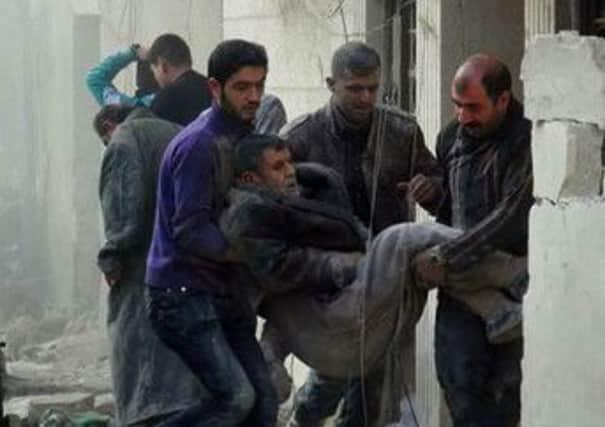Edward M Spiers: Far from Syria, the propaganda war rages


Britain’s Foreign Secretary, William Hague, urged the Syrian delegates from both sides to “seize the chance” to end the bloody civil war, while US Secretary of State, John Kerry, claimed that the United States could “see only one option, negotiating a transition government by mutual consent”, and that President Bashar Assad could not be part of the transitional arrangements.
However, the early outbursts of acrimony and bitter exchanges between the delegates have led many observers to doubt that a peaceful resolution could prove possible at this stage. So why are the delegates there?
Advertisement
Hide AdAdvertisement
Hide AdOn all sides, it seems, the Swiss talks have provided a perfect platform for expanding the propaganda battle that is being waged just as vigorously between Assad’s forces, the rebels, and their external backers as the conflict on the ground.
The Syrian Foreign Minister, Walid al-Moallem, leads the regime’s delegation despite the absence of Iran, Syria’s principal supporter in the region, whose invitation to attend the conference was revoked. He knows that Russia will support his prime demand that terrorists should be ejected from Syria, and asserts that “nobody in this world has the right to withdraw the legitimacy of a president or government… other than the Syrians themselves”.
He appreciates, too, that the regime is negotiating from a position of relative strength, and that it has made significant territorial gains in Syria, capturing key towns while the rebel forces have lapsed into internecine warfare.
The Western and Saudi-backed Syrian National Coalition, headed by Ahmad al-Jarba, has come to Geneva ostensibly to seek Assad’s removal but in reality to seek international legitimacy.
Advertisement
Hide AdAdvertisement
Hide AdMany of its members are exiles, and its former armed wing, the Free Syrian Army, suffered a massive loss of support in 2013 to jihadist groups, including the Al-Nusra Front and the Islamic State of Iraq and Syria (ISIS).
While none of the al-Qaida associates are represented in Geneva, the Western-backed coalition has sought rehabilitation on the ground through the new Syrian Revolutionary Front. Funded by the US and Saudis, with plentiful supplies of weapons from Qatar and Saudi Arabia, this body is fighting ISIS in several towns of northern Syria and in the central city of Hama.
The claims and counter-claims from this fighting serve as a backdrop to the Geneva conference.
So, too, did the release on the eve of the talks of a cache of 55,000 images smuggled out of Syria, purportedly revealing the torture and killing of an estimated 11,000 detainees by Assad’s forces.
Advertisement
Hide AdAdvertisement
Hide AdGathered by the Qatari authorities, staunch supporters of the Sunni rebels, the release of this information buttressed the West’s claims that Assad could not be part of a transitional government,
As William Hague claimed, the report offered “further evidence of the systematic violence and brutality being visited upon the people of Syria by the Assad regime”.
While this propaganda battle reverberates around Geneva, little can be expected of the talks beyond the possibility of minor agreements on prisoner exchanges and on letting humanitarian aid enter disputed areas.
Any prospect of further progress must wait upon the consolidation of a much more credible opposition in Syria, and an erosion of Assad’s grip on key parts of the country. Only then can the vital changes occur, namely the loss of Assad’s military support at home and his external backing from Russia and Iran.
*Edward M Spiers is Professor of Strategic Studies at the University of Leeds.